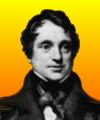 | TODAY IN SCIENCE HISTORY NEWSLETTER - 22 MARCH |
| Feature for Today |
 On 22 Mar 1768, Bryan Donkin was born, an English mechanical engineer who improved the Fourdrinier machine for making paper in continuous lengths. On 22 Mar 1768, Bryan Donkin was born, an English mechanical engineer who improved the Fourdrinier machine for making paper in continuous lengths.His ingenuity extended in other directions: he also developed printing machinery and invented the composition roller used in printing. Donkin held other patents on gearing, steel pens, paper-making and railway wheels. He also worked on the preservation of food in airtight containers (1813), revolution counters and improved accurate screw threads for graduating mathematical scales. For even more background on an interesting inventor, who is probably otherwise unknown to you, read this obituary from 1855 for Bryan Donkin. |
| Book of the Day | |
| |
| Quotations for Today | |
 | "The fact that Science walks forward on two feet, namely theory and experiment, is nowhere better illustrated than in the two fields for slight contributions to which you have done me the great honour of awarding the the Nobel Prize in Physics for the year 1923. Sometimes it is one foot that is put forward first, sometimes the other, but continuous progress is only made by the use of both—by theorizing and then testing, or by finding new relations in the process of experimenting and then bringing the theoretical foot up and pushing it on beyond, and so on in unending alterations." |
 | "Considered as a mere question of physics, (and keeping all moral considerations entirely out of sight,) the appearance of man is a geological phenomenon of vast importance, indirectly modifying the whole surface of the earth, breaking in upon any supposition of zoological continuity, and utterly unaccounted for by what we have any right to call the laws of nature." |
 | "(There is no shortage of scientific talent.) But (I am) much less optimistic about the managerial vision (of the pharmaceutical industry) to catalyse these talents to deliver the results we all want." |
| QUIZ | |
| Before you look at today's web page, see if you can answer some of these questions about the events that happened on this day. Some of the names are very familiar. Others will likely stump you. Tickle your curiosity with these questions, then check your answers on today's web page. | |
| Births | |
 |  Robert Andrews Millikan, born 22 Mar 186, was an American physicist who was awarded the 1923 Nobel Prize for Physics for "his work on the elementary charge of electricity and on the photoelectric effect." Millikan's famous oil-drop experiment (1911) was far superior to previous determinations of the charge of an electron. Millikan also studied and in 1925 coined the term now used for certain radiation from outer space. Robert Andrews Millikan, born 22 Mar 186, was an American physicist who was awarded the 1923 Nobel Prize for Physics for "his work on the elementary charge of electricity and on the photoelectric effect." Millikan's famous oil-drop experiment (1911) was far superior to previous determinations of the charge of an electron. Millikan also studied and in 1925 coined the term now used for certain radiation from outer space.  What name did Millikan give the radiation he studied? What name did Millikan give the radiation he studied? |
 |  Adam Sedgwick, born 22 Mar 1785, was an English geologist who named the geologic period of time, now dated at 570 to 505 million years ago. Adam Sedgwick, born 22 Mar 1785, was an English geologist who named the geologic period of time, now dated at 570 to 505 million years ago.  What is the name he gave this geologic period? What is the name he gave this geologic period? |
| Deaths | |
 |  William Symington (1763-1831) was a British engineer who developed one of the first practical steamboats, the Charlotte Dundas, commissioned by Lord Dundas and designed for the Forth and Clyde canal. William Symington (1763-1831) was a British engineer who developed one of the first practical steamboats, the Charlotte Dundas, commissioned by Lord Dundas and designed for the Forth and Clyde canal.  What form of propulsion did the steam engine drive to propel the boat? What form of propulsion did the steam engine drive to propel the boat? |
| Events | |
 |  On 22 Mar of a certain year, the first laser was patented by Arthur Schawlow and Charles Hard Townes, researchers at the Bell Telephone Laboratories. On 22 Mar of a certain year, the first laser was patented by Arthur Schawlow and Charles Hard Townes, researchers at the Bell Telephone Laboratories.  In what decade was the laser patented? In what decade was the laser patented? |
 |  On 22 Mar1895, the first motion picture shown on a screen was presented to an invited audience, who viewed a film shot specially for the occasion showing workers leaving the inventors' own factory, which made various photographic products. The workers streamed out, most on foot, some with their bicycles, then followed by those with cars. On 22 Mar1895, the first motion picture shown on a screen was presented to an invited audience, who viewed a film shot specially for the occasion showing workers leaving the inventors' own factory, which made various photographic products. The workers streamed out, most on foot, some with their bicycles, then followed by those with cars.  In what country did this first showing of a film on a screen take place? In what country did this first showing of a film on a screen take place? |
| Answers |
When you have your answers ready to all the questions above, you'll find all the information to check them, and more, on the March 22 web page of Today in Science History. Or, try this link first for just the brief answers. Fast answers for the previous newsletter for March 21: the cell's use of oxygen; the decade including the year 1978; cocaine; plutonium; twenties (age 24). |
| Feedback |
 If you enjoy this newsletter, the website, or wish to offer encouragement or ideas, please send feedback by using your mail reader Reply button. If you enjoy this newsletter, the website, or wish to offer encouragement or ideas, please send feedback by using your mail reader Reply button. |
--
If you do not want to receive any more newsletters, Unsubscribe
To update your preferences and to unsubscribe visit this link

Δεν υπάρχουν σχόλια:
Δημοσίευση σχολίου